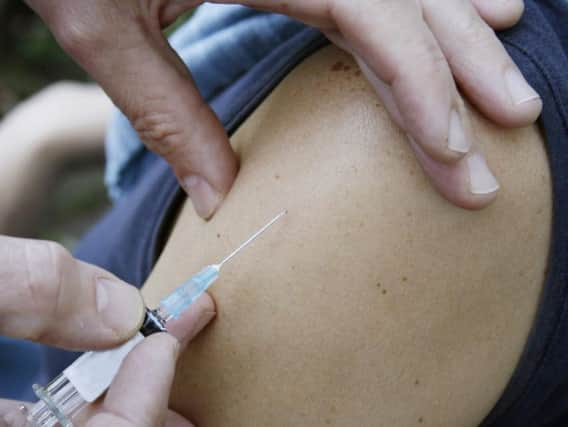Health experts launch campaign to get people in Northamptonshire to get the flu jab


Statistics from Public Health England showed that last year, over 80,000 people in the Northamptonshire area did not protect themselves from flu that winter.
Just 38 percent of pregnant women, 41 percent aged six months to 65 years and 69 percent of people aged 65 years took up the offer of a free NHS flu vaccination. This meant that thousands of people ran the real risk of catching this very serious disease, rather than having a simple flu jab.
Advertisement
Hide AdAdvertisement
Hide AdMost cases of flu in the UK occur during an 8-10 week period during the autumn and winter months. Last year there were 529,613 deaths registered in England and Wales, an increase of 28,189 (5.6 percent) compared with 2014.
The majority of the increase in deaths in 2015 happened during the first few months of the year, coinciding with an increase in hospital admissions for flu and reports of numerous outbreaks of the virus in care homes. Respiratory diseases, such as flu, were also mentioned in a third of deaths from dementia and Alzheimer’s last year.
Flu immunisation is one of the most effective ways to prevent flu and so reduce the potential harm it can cause. The most likely viruses that will cause flu each year are identified in advance of the flu season in the UK and vaccines are then made to provide protection against these strains as closely as possible.
Those at greater risk from flu include people aged 65 or over, pregnant women, the very young and people with health conditions such as severe asthma, chest or heart complaints and diabetes. An annual flu vaccine nasal spray is also now offered to healthy children aged two, three and four years old, and to children in school years one and two.
Advertisement
Hide AdAdvertisement
Hide AdDr Darin Seiger, GP Chair of NHS Nene CCG, said: “The flu vaccine reduces risk of serious illness, hospitalisation and even death among those who are most at risk. I would urge everyone who is eligible to have the flu vaccination as early as possible before flu starts circulating in the community.
"The best time to have the vaccine is always in the autumn, so it’s important that everyone is protected now.
“The flu vaccine changes every year to fight the latest strains of flu so even if you had a jab last winter you need another one this year to stay flu safe.
"My patients who are reluctant to have a flu jab often worry that they will catch the flu from the flu jab, so let me reassure everyone that the jab doesn’t contain the ‘live’ virus so it cannot give you the flu.
Advertisement
Hide AdAdvertisement
Hide Ad"Simply contact your GP or a participating pharmacy to arrange a convenient appointment and get your jab. It’s quick, safe and free for those most at risk from the virus."
Flu is an infectious and common viral illness spread by coughs and sneezes. Common symptoms of flu include sudden onset of fever, chills, headache, myalgia, extreme fatigue, a dry cough, sore throat and stuffy nose. In young children gastrointestinal symptoms such as vomiting and diarrhoea may be seen.